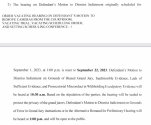Actually, the State cannot be compelled to subpoena someone they don't want to subpoena. If the Defense wants this information so badly, then they need to bring the issue to the Court.
Then, since the information involves someone who believed they would remain (medically) anonymous), the Judge will have to make a big decision about whether to issue that subpoena - to a person who is apparently completely unrelated to the case in any way other than having uploaded their DNA to Othram.
If the goal is simply to get the FBI to say which service they used (and what they sent), I believe that information has already been shared. But if the Defense wants something the State doesn't have, and the State says they don't have it, then it's up to the Defense to get the subpoena - not the State.
IMO. Several times the State has said they do not have this information and several times the Judge has asked the State to check again - and they say the FBI has it, not them.
If the FBI is subpoenaed, I assume the Boston Bar Association's assessment is useful: the FBI typically refuses all subpoenas from local courts to compel an investigator to testify. Here's their document on just how difficult it is to get a current FBI agent to come to court:
That's why we see so many "ex-FBI" people testifying in court. It has to go through a different court than Latah County Superior Court - it has to go to the U.S. Attorney's office for the jurisdiction in question (Latah County). And that's just the start - try reading through the procedure. Defense can do this - but I suspect they know it would be a waste of time, so they are trying to get the State to admit it has something it does not have (FBI records).
The Judge will see the evidence that makes the Defense think that this evidence exists within the FBI. If it's either non-discoverable (FBI work product) or the Defense cannot convince the Judge that it exists, then it's over. Judge Judge cannot subpoena the FBI - but the Defense can go to Federal Court/U.S. Attorney General. I figure that'll add years to these proceedings, and I do not say that lightly. Do take a look at the above document for how hard it is to bring the FBI to the table. The State doesn't want to pursue this route - too long.
The Defense has its own path it can take, to get the FBI info. And it can take what will almost certainly an initial "NO" answer further - to Federal Courts. This is expensive. AT has to keep her eye on what Idaho's legislature and legal system can endure and what is likely to help the case. She could spend a few years and a lot of money - and still get nothing, if in fact, the FBI has no records (only personal communication) about this matter. The records produced could be identical to what has already been given.
But if AT's plan is to make this trial process last as long as possible, it would behoove her to go ahead and follow the route outlined by the Boston Bar Association (there are other guides, even longer than that one) .
IMO.



